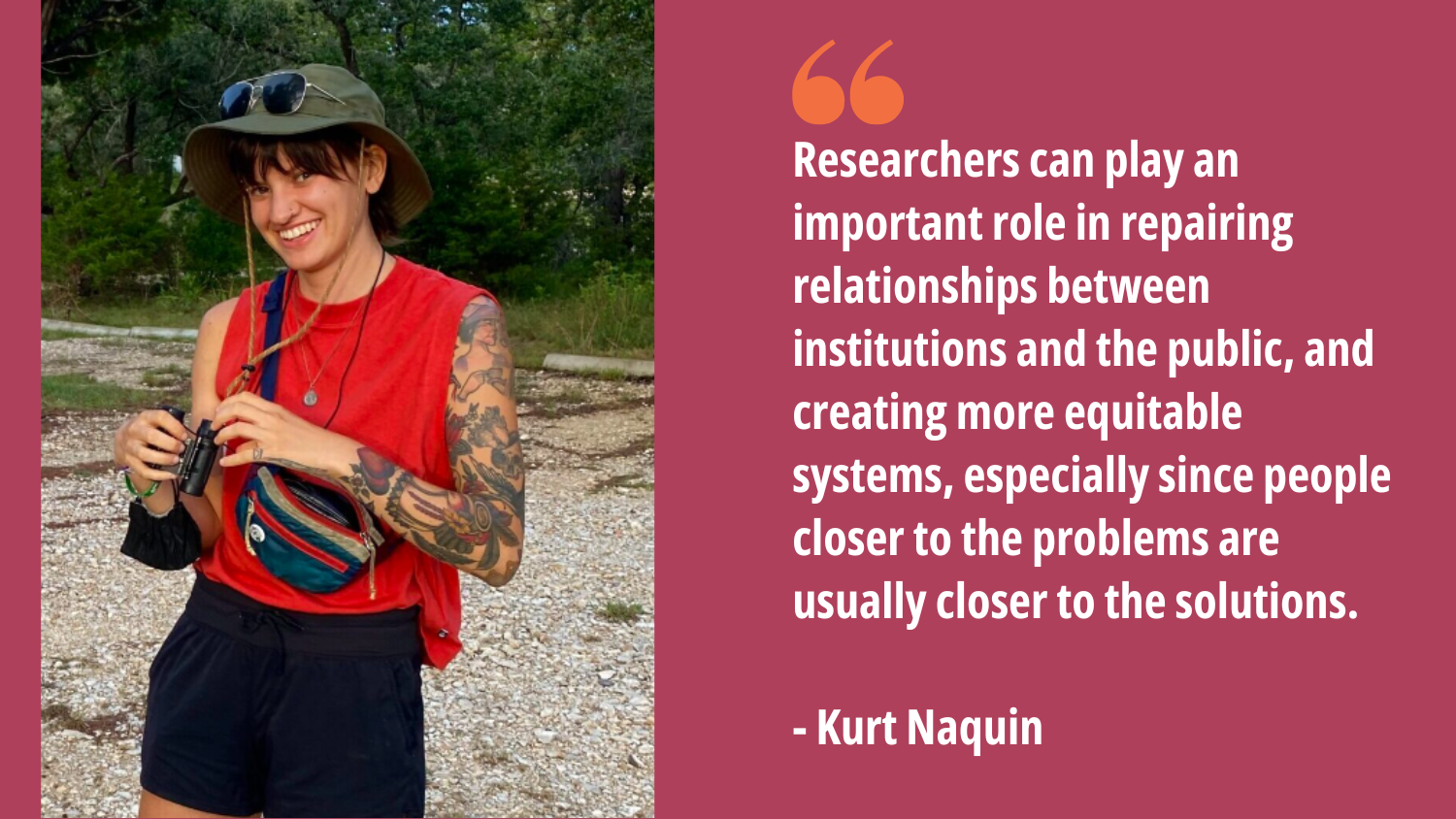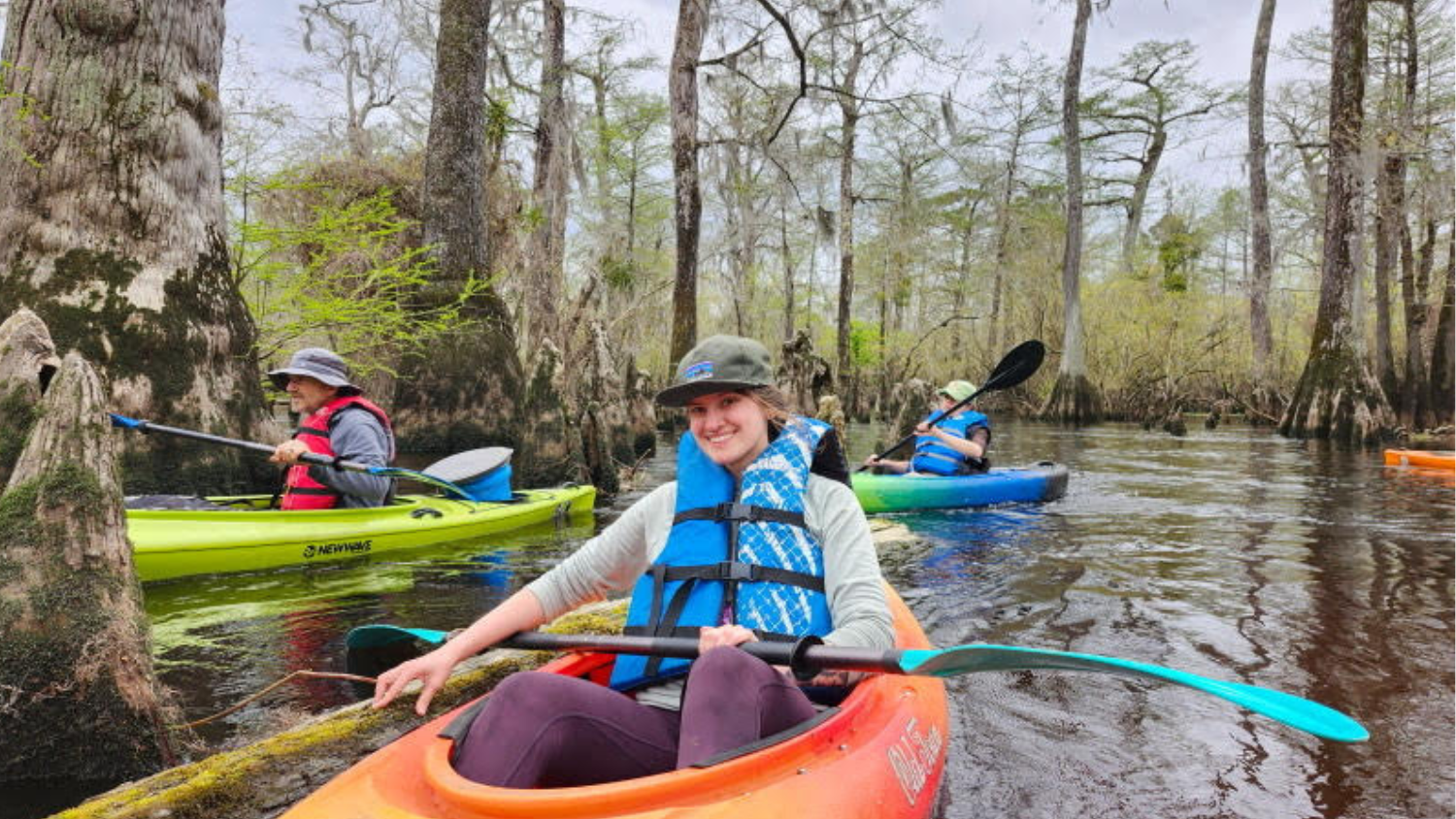Researcher Spotlight – Kurt Naquin

2023-24 Global Change Research Fellow
PhD Student, Forestry and Environmental Resources
Advisor: Dr. Caren Cooper
About You
What do you study?
I study conservation social science. In other words, I study human relationships to the environment. I also look at the way that local communities, scientific institutions, and NGOs interact with each other to solve complex environmental issues. My area of focus is in participatory science, which is research that engages members of the public in generating new knowledge. I’m especially interested in how participatory science (community based science, or citizen science) can be a capacity building tool for communities most vulnerable to climate change. My current research project is on documenting Indigenous experiences within participatory science to see how Indigenous Data Sovereignty can be prioritized in future collaborations. One major goal of my research is to update the Citizen Science Data Ethics Toolkit to include considerations for Indigenous Data Sovereignty.
What (or who) influenced you to go into this field of study?
Before attending grad school, I worked for a large environmental non-profit in communications and narrative strategy in the Gulf South (where I am from). The Gulf South environmental movement is a very radical and transgressive space, and I got to work alongside incredible leaders on the frontlines of climate change and environmental justice. I’m also Indigenous (Houma) to Southern Louisiana, and I’m really inspired by many Gulf South environmental justice and Indigenous communities’ self-determination. I saw the potential of participatory action research to bolster community autonomy over their futures. However, collaborative projects or partnerships can come with unchecked power dynamics between communities and institutions that may have more money or political influence, which can lead to extractive outcomes. I met so many tenacious people in the Gulf South who continue to go against the grain and demand justice and cooperation on their own terms, and I wanted to figure out how to make empowering relationships rather than exploitive partnerships.
What do you think is the most pressing issue related to global change?
The uneven distribution of power and resources. Researchers can play an important role in repairing relationships between institutions and the public, and creating more equitable systems, especially since people closer to the problems are usually closer to the solutions. It’s not just about observing the effects of climate change, or even trying to communicate the findings afterwards; it’s about getting communities on board with the research, from planning stages to rolling out solutions. Collaboration can break down barriers, making sure the insights gained are not just available but truly useful for those who need them most. It’s a way of passing the baton. An equitable future requires an equitable process.
About Your Research

What is the most important thing that you’ve learned?
I think the most important thing I’m learning is that research is another form of storytelling. For Indigenous and other non-western cultures, storytelling is a fundamental part of knowledge transfer, about the world, ourselves, and each other. Stories are data – and data are stories. Everyone’s research tells a story – no matter how technical or “objective” it is postured to be – and that’s why data governance matters. An important part of Indigenous data sovereignty is the right to tell our own story – and to not have our stories withheld from us. As researchers, we know that data is used to make critical decisions, to inform policy, and govern society. Indigenous people have the inherent right to self governance, which means that data sovereignty is essential to our self-determination, and to direct where our stories lead.
Who will benefit from your research?
Hopefully, Tribal governments and Indigenous collectives involved in different participatory projects, and other environmental justice communities who are concerned about data sovereignty. It would also help institutions that hope to collaborate with these groups.
How would you describe your research to a 3rd grader?
Imagine that you had a bunch of wood from the forest in your backyard and you wanted to build a treehouse, but you don’t have all the tools you need to build it. Your friend has a lot of tools, so you ask them for help. Your friend says yes, but the treehouse has to be built in their yard because their parents won’t let them use the tools elsewhere. That feels unfair, but you agree, as long as you and your family can play there any time you want. Then after it’s built, your friend says that their parents can only let you play there sometimes. And now they’re even letting people you don’t know play in the treehouse without talking to you about it, and you’re worried that the strangers might damage the treehouse. Later on, your friend asks you for more of your wood to add onto it and fix parts that got messed up. What would you do? My research is kind of like figuring out how to take care of the treehouse.
About Your Global Change Research Fellow Experience
How do you expect the SE CASC Global Change Research Fellows Program to impact you and your work?
The Global Change Research Fellows Program has allowed me to get connected to a lot of amazing people working on great climate change initiatives, including other Indigenous scholars, who value the research I’m doing and see how it relates to their work too. It’s been awesome to be around people who want to do community based research across so many different disciplines. SE CASC staff, the guest lecturers, and the other Global Change Research Fellows have introduced me to many new ways of thinking and concepts that I’ll be implementing throughout my academic journey.
What advice would you give to a student that is interested in getting involved in your field?
Don’t worry about disciplinary divisions or definitions too much – if you think you have a good idea, run with it! We need creative, multidimensional thinkers to help solve the climate crisis. And remember that you’re just one piece of the puzzle – so if you ever feel like you don’t have all the answers, it’s because you don’t, and no one does! But you do bring a lot to the table. Enjoy working collaboratively and learning from others. Get good people in your corner – reach out to people, go to seminars, take advantage of the resources around you, and share your ideas with others. It’s so important to build connections, because research really is relational – but remember that you can’t rush relationships, which means you can’t rush your work, either – so don’t be afraid to take it slow(er) and take your time.
What has been the most rewarding part or your favorite part of being a SE CASC Global Change Research Fellow?
I really enjoyed the Field Intensive retreat we had at the beginning of the school year. I learned a lot about climate change in North Carolina and how NC State and different agencies are working together to tackle big problems. The Field Intensive introduced me to WAMPUM, which is a fantastic Indigenous adaptation framework addressing sea level rise. I also loved the creative communications activity that we did, which demonstrated how there’re so many different ways to talk about research and climate change. As a first year PhD student who has been out of school for four years, it was really meaningful to have a week where I could get my bearings a bit and feel more prepared for this huge life change. Having my graduate school journey begin by bonding with other fellows and be in a space where interdisciplinary research is truly embraced was very impactful.
Learn more about the Southeast Climate Adaptation Science Center’s Global Change Research Fellows program.
- Categories:
